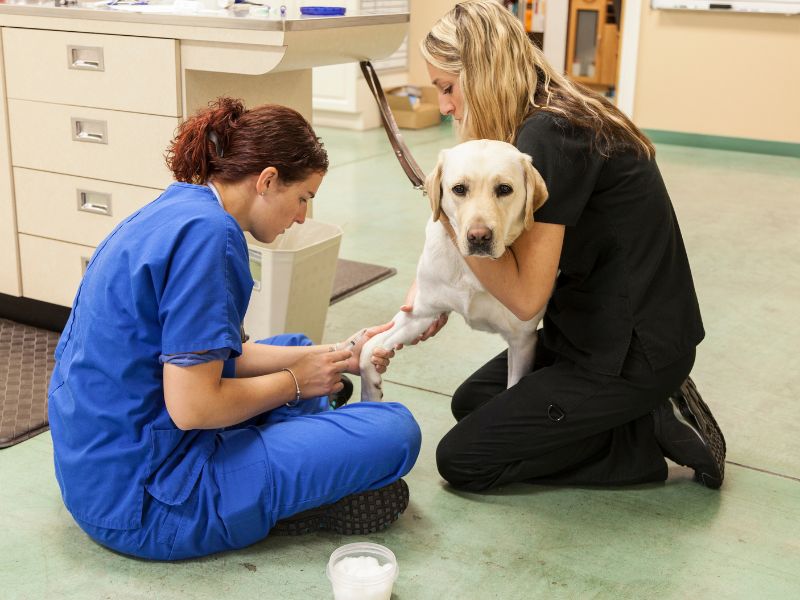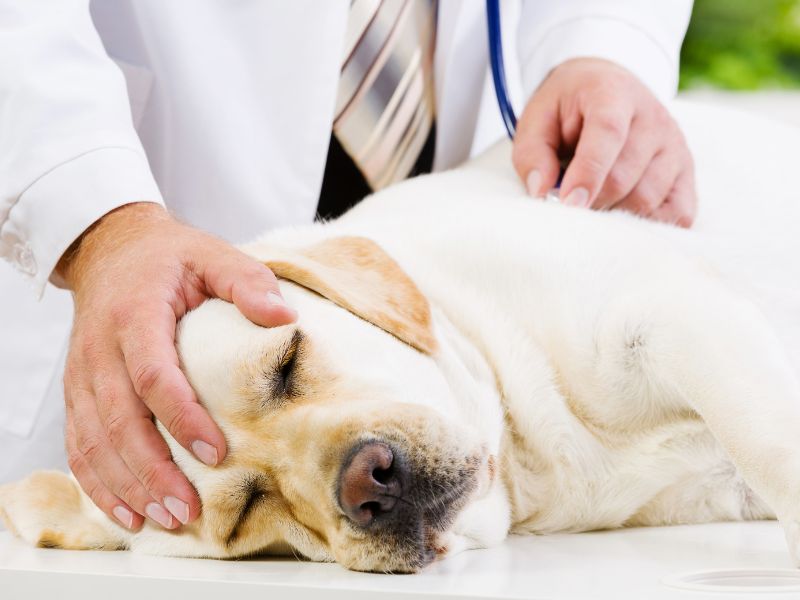Labrador Retrievers are known for being friendly, loving, and active members of their families. As the most popular dog breed in the U.S., it’s essential for Lab owners to understand the health issues and needs that are common to this breed in order to maintain their well-being and happiness.
While Labrador Retrievers are generally healthy and well-constructioned dogs, they are prone to certain health conditions, such as hip and elbow dysplasia. Both of these joint conditions have a strong genetic component, though the specific genes responsible have yet to be identified. Additionally, Labradors are known for their floppy ears, which can make them more susceptible to ear infections due to bacteria finding a suitable breeding ground.
By staying informed about the health conditions common to Labradors, and staying proactive about their care, you can ensure that your furry friend stays healthy and active throughout their life. Remember to consult a veterinarian when needed and provide your Labrador with a balanced diet and exercise to maintain their overall well-being.
Keeping Your Labrador Healthy
Labradors are known for their energetic and playful nature. To ensure they stay healthy and happy through their lifespan, there are certain important aspects to focus on.
One of the most crucial components of a Labrador’s well-being is a balanced diet. A nutritious diet that caters to the dog’s age, weight, and activity level should be maintained. Feeding them the appropriate portions can help avoid obesity. It’s essential to consult your veterinarian for the right meal plan, frequency, and quantity suited for your Labrador.
Exercise plays a significant role in the overall health of a Labrador. Due to their high energy levels, Labradors require regular physical activity to keep them fit and mentally stimulated. Daily walks, playtime in the park, or engaging in water activities like swimming can help your Labrador stay active and maintain a healthy weight.
Preventive Measures should be taken to avoid common and potential health issues. This includes vaccinations, flea and tick preventatives, and regular dental checkups. Always stay proactive in addressing any unusual behavior or symptoms by visiting your veterinarian promptly.
Grooming is another essential aspect of Labrador care. Regular grooming helps prevent issues such as skin infections, matting, and excessive shedding. Brushing their coat, cleaning ears, and trimming nails should become a part of their routine care.
In addition to physical care, Labradors, like any other dogs, benefit greatly from emotional well-being. Bonding with your dog strengthens the relationship and enhances their happiness. Spend quality time with them, engaging in activities they enjoy and ensuring their comfort and security.
Lastly, regular visits to the vet keep you informed about your Labrador’s health status. Routine checkups can help identify any health concerns early on, allowing you to address them promptly and effectively.
By following these guidelines and maintaining a close relationship with your veterinarian, you can provide the best possible care to your Labrador, ensuring they live a healthy and happy life.
What to Do When Your Labrador is Sick
A sick Labrador can be a cause for concern. When your beloved pet falls ill, it is essential to understand the common symptoms and provide the appropriate care. The following suggestions will help guide you through the process when your Labrador becomes sick.
Firstly, always monitor your dog for any changes in behavior or appearance. For example, if your Labrador is experiencing vomiting, diarrhea, lethargy, or a decrease in appetite, these could indicate sickness. It is essential to keep track of these symptoms to better understand their condition.
In some situations, home care can be beneficial for your dog, such as providing clean water and a comfortable resting area. However, it is important to consult with your veterinarian if symptoms persist or worsen. They can advise on the best course of action, whether it be medication or a change in your Labrador’s diet.
Frequent grooming and ensuring your Labrador’s ears stay clean and dry are excellent preventive measures. Groomers can remove excessive hair from their ears, reducing the risk of infections. Additionally, maintaining up-to-date vaccinations can significantly contribute to your dog’s overall health and help prevent illnesses.
If your Labrador displays symptoms not requiring immediate medical attention for more than 2 or 3 days, it is still a good idea to call your veterinarian. They can provide guidance on whether your pet needs to visit the clinic for further examination.
In conclusion, understanding your Labrador’s symptoms, monitoring their condition, and knowing when to seek professional help are vital steps in ensuring their health and well-being. Keep these suggestions in mind, and your Labrador will be on the path to recovery in no time.
When to Call the Vet
A Labrador’s health is essential for their overall happiness and well-being. Sometimes it can be challenging to know when to call the vet for help. Here are a few situations when it is crucial to consult your veterinarian.
First and foremost, if your dog is experiencing frequent vomiting or vomiting blood, it is essential to call the vet immediately. Occasional vomiting may not be a cause for concern, but if your Labrador shows persistent signs, it is vital to get professional help.
Another situation that warrants a call to the vet is if your Labrador swallows something potentially harmful. Be vigilant to monitor for any distress, odd behavior, or physical issues such as limping, dragging a limb, or an unusual cry. These indicators might signal an underlying problem, and it’s better to be safe than sorry.
Keep an eye out for any discharges from your dog’s body, such as their eyes, ears, or nose. Discharge can suggest an infection, which should be addressed by your veterinarian as soon as possible. It is also important to call the vet if your Labrador experiences cuts, severe falls, or any other sudden physical trauma.
In general, if your Labrador exhibits any symptoms that last for more than 2 to 3 days and are not listed as an emergency in your vet’s guidelines, it is wise to consult them for advice. Trust your instincts and use common sense. If you feel something is wrong with your Labrador, don’t hesitate to reach out to your veterinarian. A friendly, third-person tone of voice helps convey this essential information to Labrador owners in a reassuring manner, ensuring that their furry friends receive the best possible care.
Normal for Puppies
A healthy Labrador puppy is full of life and energy when awake, but also enjoys deep sleep during rest periods. It is perfectly normal for Labrador puppies to be lively and curious, exploring their surroundings and showing interest in the world around them. Their natural scent should be pleasant, with clean ears and bright eyes free from any discharge.
Labrador puppies typically need to urinate frequently, with hourly intervals or even more often being the norm during the day. It’s important to keep an eye on this routine, as it can help you understand your puppy’s health and well-being.
When it comes to mealtime, healthy Labrador puppies have hearty appetites. They readily devour their food with enthusiasm and may have multiple bowel movements between waking up and bedtime. To maintain their good health, it’s crucial to provide them with a balanced diet designed for puppies of their breed and size.
Regular grooming and hygiene maintenance are essential for puppy health. It’s important to brush their teeth, clean their ears, and trim their nails as needed. Gently wiping their face with a moistened washcloth can help prevent any buildup around their eyes and mouth.
Lastly, keeping your Labrador puppy happy and healthy includes offering them the opportunity to engage in daily physical activities and mental stimulation. Take them for walks, play fetch, and expose them to new environments to help them grow into confident, well-rounded adult dogs.
Remember to always consult with a veterinarian if you have concerns about your Labrador puppy’s health. Regular checkups and vaccinations are necessary to ensure they remain strong and healthy throughout their life.
Not Normal for Puppies
Labrador puppies, like any other breed, can experience health issues that are not considered normal. Recognizing the signs of these issues early on is crucial to ensure the well-being of your furry friend. In this section, we will discuss some common health concerns that may affect young Labradors, and how to spot them.
One common health issue among Labrador puppies is hip dysplasia. This hereditary condition affects the hip joint, causing pain and discomfort. Signs of hip dysplasia in puppies may include difficulty getting up, reluctance to go up and down stairs, or limping. If you notice any of these symptoms, it is essential to consult with your veterinarian.
Another health concern to watch for in Labrador puppies is ear infections. Due to their floppy ears, Labradors are prone to developing ear infections. Symptoms to look out for include head shaking, excessive scratching at the ears, or unpleasant odor coming from the ears. Regular ear cleaning and checking for any signs of infection can help prevent these issues.
Labrador puppies may also be at risk of skin allergies. Allergies can manifest as itchiness, redness of the skin, or even hair loss. If you notice your puppy constantly scratching or displaying irritated skin, it is essential to visit your veterinarian to determine the cause and find the appropriate treatment.
Bloat is another health issue that can affect Labrador puppies. This condition occurs when the stomach fills with gas and twists on itself, causing discomfort and life-threatening complications if left untreated. Signs of bloat include a rapid and loud heartbeat, drooling, attempts to vomit without success, and a visibly swollen abdomen. Bloat is an emergency and requires immediate veterinary attention.
To ensure your Labrador puppy remains happy and healthy, it is important to be vigilant for any signs of these health issues, and consult with your veterinarian if you have any concerns. Regular check-ups, a balanced diet, and proper exercise can help prevent many of these common health problems in your furry companion.
Puppies Under Eight Weeks Old
Labrador puppies under eight weeks old are still in a crucial stage of their development. During this period, they are gradually learning to interact with their environment, siblings, and humans. This is also the time when their physical and mental growth is rapidly occurring.
It is essential to provide proper care for puppies at this young age. This includes a healthy and balanced diet, as well as a clean and safe environment where they can explore and grow. The mother’s milk is the best source of nutrition for puppies under eight weeks, as it contains essential nutrients and antibodies that are vital for their immune system.
Puppies at this age should start socializing with other dogs and humans. This helps them learn essential social skills and become acquainted with various sights, sounds, and smells. It’s important to be gentle and patient with your Labrador puppy, as they are still learning how to navigate the world around them.
During this stage, Labrador puppies will show behavioral changes such as becoming more active, curious, and playful. It’s essential to monitor and guide their actions to prevent accidents or injuries. Some basic behavioral milestones to expect in puppies under eight weeks old include:
- Opening their eyes around 10-14 days old
- Starting to walk around three weeks old
- Gradually becoming more independent from their mother and siblings
Remember that different Labrador puppies may develop at different rates. It’s essential to pay close attention to their progress and consult with a veterinarian if you have concerns about your puppy’s growth or development.
In summary, providing proper care and early socialization for Labrador puppies under eight weeks old is crucial for their overall health and wellbeing. Empower your puppy to develop into a well-rounded and happy adult dog by ensuring a nurturing environment and understanding their unique milestones during this early stage.
More Information
Labrador Retrievers are known for their friendly and energetic nature, making them a popular choice for families. Their medium-to-large size, with an average height of 21.5 to 24.5 inches at the shoulder and a weight range of 55 to 80 pounds, makes them suitable for active homes.
The Labrador Retriever has a double coat for protection in various weather conditions. This breed is a part of the Sporting Group and typically has a lifespan of 11-13 years. Some key personality traits include being affectionate, good with cats and dogs, good with kids, playful, and rowdy.
Despite their generally robust health, Labradors can be prone to certain health issues. As a responsible pet owner, it’s essential to be aware of these potential problems and take necessary measures to maintain your Labrador’s well-being.
While Labradors may experience fewer health problems compared to other breeds, they can still face some issues such as hip dysplasia, elbow dysplasia, and certain eye conditions. Regular check-ups with a veterinarian can help detect early signs of these conditions and ensure the best possible care for your furry friend.
When it comes to diet, Labradors have a reputation for being prone to obesity. It’s important to provide them with a healthy, balanced diet and monitor their weight to prevent any potential health complications. Regular exercise is also crucial for maintaining a Labrador’s physical and mental health.
In summary, caring for a Labrador Retriever involves being mindful of their unique physical and personality traits. Ensure that they receive proper nutrition, exercise, and veterinary care to keep them healthy and happy for years to come. With the right attention and love, your Labrador will surely be a beloved and loyal companion.














